On 27 October, the conference elected the new 12-member Radio Regulations Board (RRB) and the 48 Member States that will constitute ITU Council for the next four years, concluding one of the key items of the PP-14 agenda.
The vote follows the election on 23 and 24 October of the new ITU Secretary-General and Deputy Secretary-General, as well as the Directors of the Union's three Bureaux – Radiocommunication (BR), Telecommunication Standardization (TSB), and Telecommunication Development (BDT).
ITU Council acts as the Union's governing body in the interval between Plenipotentiary Conferences while one of the Board's main functions is to approve rules of procedures to facilitate application of the Radio Regulations, the international treaty governing the use of the radio-frequency spectrum and the geostationary-satellite and non-geostationary-satellite orbits.
RRB membership by region
To achieve geographical balance, Board members are elected from ITU's five administrative regions. Two members are elected each from Regions A, B and C, and three each from Regions D and E as follows:
-
Region A: Americas (2 members).
-
Region B: Western Europe (2 members).
-
Region C: Eastern Europe and Northern Asia (2 members).
-
Region D: Africa (3 members).
-
Region E: Asia and Australasia (3 members).
RRB election results
ITU Council Member States by region
Each of the five administrative regions is entitled to a designated number of seats as follows:
-
Americas (Region A) has 9 seats.
-
Western Europe (Region B) has 8 seats.
-
Eastern Europe and Northern Asia (Region C) has 5 seats.
-
Africa (Region D) has 13 seats.
-
Asia and Australasia (Region E) has 13 seats.
ITU Council election results
Committee 5 (Policy and Legal Matters): Deliberations continue on a range of topics
The ITU secretariat presented a report on the implementation of the
Conformance and Interoperability (C&I) programme. The report summarizes the status of implementation of this programme since PP-10 and also contains updates from the TSB Director and the BDT Director since the May 2014 Council session. PP-14 is invited to note the report.
Committee 5 then discussed proposals to revise Resolution 177 (Guadalajara, 2010) on C&I presented by the Americas, Arab and Regional Commonwealth in the field of Communication (RCC) regions, respectively, and by Venezuela, in particular its provisions on counterfeit ICT devices. A debate ensued on whether to formulate a new draft resolution based on this specific issue, notably one presented by the Americas on
Combatting ICT counterfeit, substandard, and unauthorized equipment. An ad hoc group was set up to discuss this and related matters further and to report back to the committee later in the week.
Argentina, Mexico, Paraguay and Uruguay then jointly proposed amendments to Resolution 86 on
Advance Publication, Coordination, Notification and Recording Procedures for Frequency Assignments Pertaining to Satellite Networks. Following discussions there was no consensus and some countries considered this issue should be addressed by the World Radiocommunication Conference (WRC) in 2015.
Europe followed with a proposed new draft resolution on
Strengthening the role of ITU with regard to Transparency and Confidence-Building Measures in Outer Space Activities. The Asia-Pacific region then raised the issue of
Harmful Interference and international monitoring of emissions and, together with Saudi Arabia and the United Arab Emirates, expressed the view that the World Radiocommunication Conference and/or the Radio Regulations Board were the more appropriate forums to discuss this matter. However, no consensus was reached on whether or not PP-14 should address this issue.
Europe then proposed a revision of Resolution 119 (Rev. Antalya) on
Methods to improve the efficiency and effectiveness of the Radio Regulations Board. It was decided that Europe, as the originator of the proposed revision, should hold further discussions with delegations who expressed reservations about the relevance of PP-14, rather than the WRC, to address this issue and to report back to the committee later in the week, ideally with common agreement on the way forward.
This was followed by a report on progress made by the Preparatory Committee in relation to ITU's
Role as Supervisory Authority of the International Registration System for Space Assets under the Space Protocol presented by the ITU secretariat. Discussions followed on the possible financial and legal implications involved for ITU in taking up this role and on whether it was within its mandate and mission to do so. Committee 5 then agreed that ITU Council should continue to monitor the matter and consider the issues raised by numerous countries.
Committee 6 (Administration and Management)
In its fourth and fifth meetings, Committee 6 finalized the discussion on the ITU Strategic Plan by approving the proposed revision to Resolutions 71 and 72 related to the plan. Resolution 167 on the strengthening of ITU capability for electronic meetings and Resolution 175 on accessibility for persons with disabilities, including age-related disabilities, were then discussed and received strong support from participants. The present financial constraints were taken into account during the discussion, and the proposal submitted on these matters will be harmonized prior to approval. Committee 6 then proceeded to discuss, approve and submit to the Editorial Committee revised Resolution 34 – "Assistance and support to countries in special need for rebuilding their telecommunication sector". South Sudan was added to this resolution. Revised Resolution 159 on the assistance and support to Lebanon for rebuilding its telecommunication networks was also approved. Assistance to Iraq will be addressed in a future meeting of Committee 6. In addition, the Committee approved the draft resolution on the accounts of the Union for the years 2010 to 2013.
Stemming the tide on Ebola
In a consultative brain storming session (also on 27 October) convened by ITU Secretary-General Dr Hamadoun I. Touré, delegates exchanged views on the Ebola epidemic with a view to identifying concrete actions that can be collectively taken to support the response to the current crisis through leveraging ICT.
Kicking off the session, Dr Touré expressed his "heartfelt sympathy and support to the Governments and people of Guinea, Liberia and Sierra Leone, as they strive bravely to fight this horrific disease." He commended these Governments for "their tireless efforts, and the great people of these countries for their resilience." Dr Touré underlined that the "immediate challenge is to ensure universal access to telecommunications and information and communication technology (ICT) resources in rural areas that could be used for saving lives at this critical time."
ITU has already deployed 27 satellite terminals to support ongoing efforts. "The same commitment that I have shown in the past when ITU intervened in natural disasters across the globe is what I am committing before you now to put in fighting this disease. In affected areas ICT services and applications play an important role in coordinating human logistics and ensuring timely delivery of medicines and other resources that could save lives," Dr Touré stated.
Highlighting the steps taken so far by ITU to ensure that there is support for the affected countries, the Secretary-General said "My team is also working with the World Health Organization to come up with other urgent measures that include efficient applications that could be used by government agencies, the general population and humanitarian workers."
The floor was then opened and views were exchanged on experiences from different countries such as Sierra Leone, Democratic Republic of the Congo, Ghana, Cote d'Ivoire, Senegal, Zambia, Rwanda, United States, Saudi Arabia, Russian Federation, Guyana, Cuba and others and the following proposed actions were identified as areas that could be supported or implemented by ITU:
-
Mobilizing telecommunication service providers to do everything possible to facilitate the dissemination of critical messages.
-
ITU to act and to lead partnerships on behalf of the ICT ecosystem (including operators, the Internet community etc.) to work with regulators and ministries in the affected countries for the secure release of call data records to assist researchers and responders. Work to ensure regulatory barriers are increasingly removed to ensure easy deployment and use of telecommunication applications for the purpose at hand.
-
Important emphasis on preventative actions (raising awareness; enhancing preparedness and response) for non-affected countries and to ensure that administrations have all the necessary knowledge and tools at their disposal to run effective health dissemination and awareness-raising campaigns to sensitize populations on turning back Ebola and reducing the stigma of the disease.
-
ITU to finalize developing an application in close partnership with WHO which will be rolled out in the coming weeks and will be invaluable for the general public and health workers alike. This effort will continue, working closely with success stories from member countries and in partnership with WHO, to ensure effective multi-hazard tools are soon available.
-
Support the use of big data analytics to find correlation between certain events and the possible spread of Ebola. Social media such as Facebook, twitter, blogs, and online forums could provide massive information that could be used for early warning.
A call for action and solidarity
Addressing the session, the Ambassador of Sierra Leone to the Republic of Korea said "The rate of infection continues to double month after month. And the socio-economic impact of the Ebola crisis is now well beyond our wildest imagination. Inflation has spiked exponentially as prices of food commodities have skyrocketed proportionately. The lives of families have been devastated due to the chain deaths of loved ones, and the general hardship accompanied by the crisis."
The Ambassador added that "the ultimate goal and priority of the Government of Sierra Leone is to irreversibly break the chain of transmission of the Ebola virus." The government views access to information as a central strategy in the fight against Ebola. The awareness-raising message − avoid body contact − is frequently repeated to citizens through various media including radio, mobile phones, newspapers and television.
However, "there are tens of thousands of households and hundreds of villages that do not have access to these communication media," the Ambassador said, adding that "the role of ICT in the fight against Ebola has clearly become ever more prominent in dealing with the crucial aspect of communication access and the general flow of information." He called for the intervention of all countries of the delegations present at this ITU conference, saying that their assistance "at this stage can be of tremendous respite to the ongoing national and international efforts towards the ultimate eradication of Ebola."
Côte d'Ivoire, a country that has frontiers with countries gravely affected by the epidemic, gave an example of a database it has created in order to access 21 million SIM cards. The database was then made available to the regulatory authority of that country for analysing information (such as population movements) to define public health messaging.
Rwanda renewed its commitment to join hands with everyone in the global community to fight the deadly virus. It announced that "a team of Rwandan health professionals have already joined the front lines," adding that for countries where no cases had been confirmed, it is critically important to step up preparedness efforts.
The Democratic Republic of the Congo, from where the word "Ebola" originated, shared its own experience (unrelated to the current outbreak in West Africa) and announced that it will be sending its team of best doctors to West Africa.
The United States said it wholeheartedly supports the Secretary-General's initiative. "As a leading member of the international coalition fighting this devastating disease, we encourage all ITU members to join us in implementing an effective and coordinated response. This is a global problem that requires urgent action by the entire ITU membership." The United States Government response involves multiple federal departments and agencies. Its efforts include the deployment of key medical and expert personnel, the construction of a hospital for infected medical workers, and overseeing the construction of up to 17 100-bed Ebola treatment units in Liberia.
In addition, the United States is pairing with the Government of Sweden to launch a new initiative called "Fighting Ebola: A grand challenge", which is a platform to crowdsource and incubate innovative ideas to improve delivery of care and stem the spread of the disease.
In Ghana more than 100 suspected cases have been tested and have all proven negative. "We have so far hosted the United Nations mission on Ebola emergency response and that is where the UN team is mounting their response to the Ebola virus disease in the subregions," the delegate of Ghana explained.
Nigeria, one of the first countries to contain this disease is sending health workers to support countries that have been hit by Ebola. Nigeria was declared Ebola-free on the 20 October 2014.
"While Nigeria was applauded as a spectacular success story, in the words of the WHO representative, we have only won the battle, and not the war. The war will end when West Africa is declared free of Ebola. West Africa must be declared Ebola-free but clearly this is not a West African problem. It has become a global issue with cases of infection in the United States and in Spain," said Nigeria's Federal Minister of Communication Technology, Omobola Johnson.
Ms Johnson had, earlier in her
policy statement to the conference, mentioned the role that ICT played in helping Nigeria contain this virus in the areas of awareness-building and contact-tracing. Over 70 million Nigerians are connected to the Internet. Social media played a significant role in creating an awareness amongst Nigerians on the habits and behaviours to help contain this disease. "We had a phone app that helped in reducing report times of infections by 75 per cent. Test results were scanned to tablets and uploaded to emergency databases, and field teams got text message alerts on their phones informing them of the results," she explained.
Cuba called for human, material and financial resources to fight Ebola and other diseases. More than 1000 health workers from Cuba now work in Africa, and are assisting in this common effort against Ebola.
The Internet Society (ISOC) has established the
Ebola Tech response group challenging all the Internet and ICT communities and beyond to collaborate to help fight this outbreak through Internet and other communication technologies. The Ebola Tech response is a first step on how the ISOC community can contribute to the global response, including by quickly identifying a small number of technology-based projects that can be implemented in the affected countries through sharing expertise, knowledge, and information with other experts.
GSMA said it stands ready, as an ITU Sector Member, to collaborate in mobilizing the operators in affected countries. GSMA has been working with operators and international technical and humanitarian organizations to support the operators in launching and maintaining critical messaging, data tracking and health worker services in the countries affected by. GSMA asked for ITU's assistance in moving forward with these challenges.
The Russian Federation has decided that it will contribute a targeted USD 2.5 million for 2014 and 2015. This sum will be earmarked for coordination between international public health and medical services to help stem the tide of the Ebola threat. The Russian Federation is also offering direct technical aid and support to the affected countries to help them establish public health systems to the tune of USD 4 million.
To strengthen the health systems in the African countries of Guinea, Sierra Leone and also Benin, the Russian Federation has financed the procurement and provision to these countries of medical laboratories with all the necessary drugs and preparations to serve a population of approximately 60 000 people. Guinea and Sierra Leone have already received their laboratories.
Guyana proposed a crowdfunding campaign where "the generosity of the people of the world can be leveraged using the Internet, where they can make small donations to contribute to ITU's efforts in terms of purchasing equipment that would be used in information dissemination, and reporting information in terms of tracking the virus."
Senegal gave an example of how it has been able to deal with imported cases of the Ebola Virus. A patient came from Guinea, and had entered Senegalese territory illegally. He was treated, cured, and went voluntarily back to his own country. Subsequent measures were taken to make sure that no new cases arise in Senegal.
Saudi Arabia, underlined that there is no doubt that ICT play a critical role in combating this disease. It cited its experience in dealing with the Corona virus particularly emphasizing the importance of mobile-optimized public health messaging and also stressed the importance of preparedness measures in (so far) non-affected countries.
Brahima Sanou, Director of the Telecommunication Development Bureau (BDT) updated the ITU membership on actions already under way, including the development of an application in close partnership with the World Health Organization and proposed that ITU and those who had spoken, for example, ISOC and GSMA could get together and try to" define an overarching project" to which interested parties could contribute. Calling this a contingency fund, Mr Sanou said "There are many who would like to make a financial contribution so we could establish that as a basis so that a project can be defined by this conference to establish an Internet platform or an SMS platform, a mobile application that would allow us to see how we could move forward together. That would be our contribution as the ICT community to combating Ebola. Dr Cosmas Zavazava was named as focal point to draw up a more detailed plan of action after further bilateral consultations with ITU members in Busan.
ITU and Busan City enter partnership to empower youth
ITU and Busan City signed a Memorandum of Understanding (MoU) on 27 October 2014 that recognizes the role of information and communication technologies in addressing the concerns of young people around the world. Today, an estimated 75 million youth (aged between 15 and 24) are unemployed. The MoU highlights three distinct areas of cooperation:
-
Promoting the engagement of youth in the field of ICT, encouraging them to study technical subjects to allow them to pursue careers in the ICT sector.
-
Narrowing the digital divide, by exploring ways of connecting the unconnected, and ensuring that marginalized groups have unfettered access to ICT tools and applications.
-
Promoting research on emerging ICT, particularly the Internet of Things, to ensure that young people are involved in helping the industry innovate the future of the sector.
Under the terms of the MoU, activities to facilitate this cooperation will include educational outreach programmes, capacity building and knowledge sharing, and crowdsourcing of the views of youth to international ICT forums, including facilitating participation in any activities on the Internet of Things, organized by ITU.
"Information and communication technologies play an integral role in addressing the problems that youth face today, and they have the power to create a more stable and prosperous world for our children. As Secretary-General of ITU, and as a father myself, I am optimistic about the future that we are committing to here in Busan," Dr Hamadoun I. Touré said.
Busan City Mayor Byung-soo Suh said, "This commitment will ensure that the ITU Plenipotentiary Conference has a positive and lasting impact on Busan City, and by extension, the youth of the Republic of Korea."
The MoU builds on Busan Metropolitan City's support to the Young ICT Policy Leaders programme at PP-14. The city's sponsorship made it possible for young people to participate in PP-14 via their national delegations, as a way of helping ITU to empower and engage with the next generation of ICT policy-makers, who, the Secretary-General said, "will be shaping both national and international policy for years to come".
The Republic of Korea and the City of Busan, in particular, are recognized leaders in the creation of digital services and applications, with strong academic institutions focused on training the next generation of ICT innovators. ITU is excited by Busan City's proposal not just to integrate young people into PP-14, but also to work together in the area of youth and ICT in the longer term.
|
Quick Links
Photos and Videos
ITU 2014
Interview with Ambassador Pamela K. Hamamoto, United States
Interview with Hesham El Alaily, Executive President, NTRA, Egypt
Interview with Omobola Johnson, Minister of Communication Technology, Nigeria
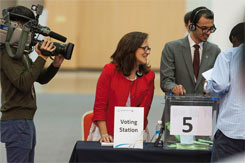
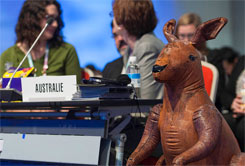

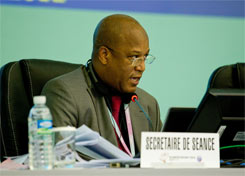
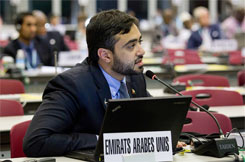
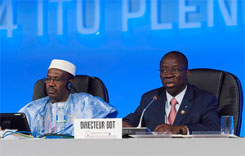
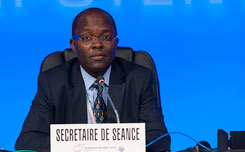
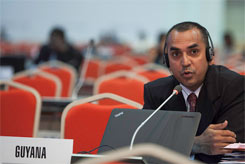
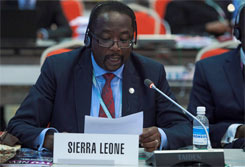
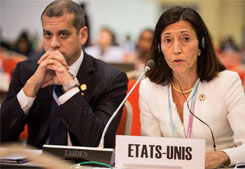
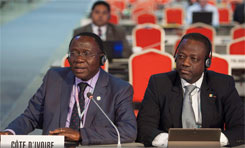
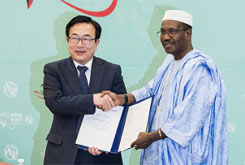
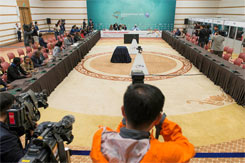
|
|
